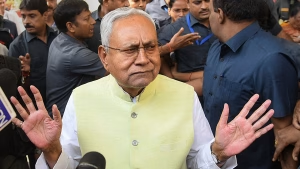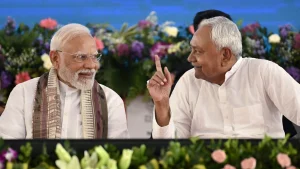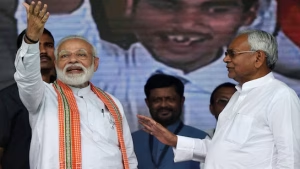Bihar – The Bihar seat-sharing talks have entered a crucial phase as Chief Minister Nitish Kumar made a strategic announcement that could reshape the dynamics of upcoming assembly elections. In a move that has captured political attention across the state, Kumar “unilaterally” named former minister Santosh Kumar Nirala as the JD(U) candidate for Rajpur constituency in Buxar district.
This announcement comes at a time when the Bihar seat-sharing talks are in their final stages, with the National Democratic Alliance (NDA) partners preparing for detailed negotiations. The timing of Kumar’s declaration, made during a party meeting on Saturday, appears calculated to establish JD(U)’s position before formal discussions commence.
Strategic Positioning in Pre-Election Phase

Kumar’s announcement was made while flanked by Deputy Chief Minister Samrat Choudhary of the BJP, sending a clear message about JD(U)’s intentions in the upcoming Bihar seat-sharing talks. The presence of senior BJP leadership during this declaration suggests a complex political dynamic at play within the alliance.
“We have been working very hard and achieved several landmarks of development. It is the job of the people to support us and make Nirala win from here,” Kumar stated during the meeting, pointing towards the announced candidate who previously lost to Congress’s Vishwanath Ram in the 2020 Assembly polls.
Profile of the Announced Candidate


Santosh Kumar Nirala, aged 51, brings significant political experience to the table. His political journey began in the mid-1990s, and he has served as a minister twice in Bihar. Between 2014 and 2017, Nirala handled the SC-ST portfolio, later taking charge of the transport department from 2017 to 2020. The Rajpur constituency, which is reserved for Scheduled Caste candidates, has been a traditional stronghold that factors into the broader Bihar seat-sharing talks.
Historical Context of Alliance Arrangements
The 2020 election arrangements provide important context for the current Bihar seat-sharing talks. In those elections, JD(U) contested 115 constituencies while BJP fought 110 seats. The JD(U) allocated seven seats to Jitan Ram Manjhi’s Hindustani Awam Morcha (Secular), while BJP shared 11 seats with Mukesh Sahani’s Vikassheel Insaan Party. The Lok Janshakti Party, then united, contested independently.
Despite winning only 43 seats compared to BJP’s 74, JD(U) has been signaling its intention to maintain the 2020 formula and contest more seats than its ally in the upcoming polls. This positioning has become a central theme in the ongoing Bihar seat-sharing talks.
Also Read: BJP MPs Workshop Vice President Election: Critical Preparation Session
Alliance Partners’ Response Strategy
Both major allies have adopted a measured approach to Kumar’s announcement. BJP leadership characterized the move as routine, noting that Rajpur has traditionally been contested by JD(U). BJP spokesperson Manoj Sharma referred to Kumar as the “leader of the NDA” while stating that he used his prerogative to announce candidature from a seat traditionally contested by his party.
JD(U) chief spokesperson Neeraj Kumar downplayed the significance, suggesting “not much should be read into it.” He explained that the party has been contesting from Rajpur, and Nirala has represented the constituency twice before the 2020 defeat.
Timeline and Future Negotiations


Sources indicate that NDA allies are likely to finalize Bihar seat-sharing talks after the September 9 vice-presidential elections. While JD(U) and BJP have reportedly agreed to contest equal numbers of seats, other alliance partners including Chirag Paswan’s Lok Janshakti Party (Ram Vilas), HAM (S), and Upendra Kushwaha’s Rashtiya Lok Morcha are engaging in political maneuvering to secure more constituencies.
Political Implications and Alliance Dynamics
The Bihar seat-sharing talks reflect broader political calculations within the NDA. JD(U)’s recent statements about wanting to contest “at least one seat more” than BJP indicate the party’s desire to assert its position within the alliance structure. This demand represents what party leaders have termed “political symbolism” in the ongoing negotiations.
Conclusion: Setting the Stage for Electoral Battle

As the Bihar seat-sharing talks progress toward conclusion, Kumar’s announcement serves multiple purposes. It establishes JD(U)’s claim over traditional constituencies while demonstrating the party’s organizational readiness for the electoral battle ahead. The success of these negotiations will significantly impact the alliance’s electoral prospects and the political landscape of Bihar.
The coming days will be crucial as alliance partners work to balance competing demands while maintaining unity. The outcome of these Bihar seat-sharing talks will ultimately determine how effectively the NDA can present a united front in the upcoming assembly elections.

